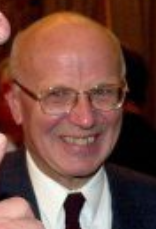Jacques van Ypersele de Strihou
( civil servant, nobility, deep state functionary) | ||||||||||||
|---|---|---|---|---|---|---|---|---|---|---|---|---|
 | ||||||||||||
| Born | 1936-12-05 Ukkel, Belgium | |||||||||||
| Nationality | Belgium | |||||||||||
| Alma mater | • University of Namur • University of Leuven • Yale University | |||||||||||
A discrete person close to the royal family but well-known in Belgian and international political and economic circles.
| ||||||||||||
Jacques Marie Joseph Hubert Ghislain van Ypersele de Strihou[1], was the Principal Private Secretary to the King of the Belgians (1983–2013). When Albert II of Belgium succeeded his brother Baudouin I of Belgium, he kept his private secretary, so Jacques van Ypersele de Strihou has served two kings. Together with Jan Willems, Marshal of the Royal Household, he represents the King at the board of the King Baudouin Foundation.
Jacques van Ypersele de Strihou is a French-speaking Christian Democrat (CDH, previously known as PSC). He is a son of Henry van Ypersele, an engineer who worked for the business group of the late Baron Empain and Martha Bansa de Kinder. Henry van Ypersele was the brother of Baron Adelin van Ypersele de Strihou and himself administrator of Royale Belge, the predecessor of Axa.
Jacques van Ypersele de Strihou is nicknamed "Van Yp" or "the Viceroy" in Belgium's political and media circles.
Education
Jacques van Ypersele went to school at the Jesuit college Saint-Michel of Brussels. He studied literature at the Facultés universitaires Notre-Dame de la Paix (FUNDP) in Namur and in addition he studied law and economy at the Catholic University of Louvain with a scholarship from the Ford Foundation[2]. During his studies, he was a member of the Olivaint Conference of Belgium, where he visited Israel, for then to become a journalist for the journal La Cité in Israel, Lebanon and Egypt.
He was an assistant at Lovanium University of Léopoldville in Congo for some months, at the time of independence. After that, he went to Yale University, on a NATO-scholarship (the IFEA, International Financial and Economic Administration, which brought together students coming from all over the world to take courses that prepared them for an active role in the national and international financial civil service[3]), where he obtained a PhD in economics with the thesis Sharing the Defense Burden Among Western Allies, under Richard Cooper.[4]
Career
In Washington, D.C., he met professor Robert Triffin, of the International Monetary Fund (IMF). Robert Triffin, his mentor, provided him with a job at the IMF in Washington, D.C., and later in 1969 at Jakarta (Indonesia), where the IMF was busy transforming the economy in the decade after the regime change and massacres. In Washington, D.C., at the IMF, he shared a room, as a junior economist, with Wim Duisenberg, the later President of the European Central Bank.
Due to his talent, and for saying the right things, he acquired international fame in a short time. State leaders, such as the German chancellor Helmut Schmidt and the French president Valéry Giscard d'Estaing praised his expertise on economics and finance. In the early 1970s he returned to Belgium, where he joined the Empain-Group, and became Vice-President of Electrorail. In 1972 he became an advisor at the cabinet of André Vlerick. He became consultant of three successive Belgian Ministers for Finance: Willy De Clercq, Gaston Geens and in 1981 of Robert Vandeputte. In 1976, he was appointed by Willy De Clercq as inspector-general of the Belgian treasury. In 1978 he became (vice-) Chief of Cabinet of Leo Tindemans, and later also of Paul Vanden Boeynants, and Wilfried Martens.
Between 1972 and 1983, he taught at the Université Catholique de Louvain (UCL) and the Institut Catholique des Hautes Etudes Commerciales (ICHEC) in Brussels. At the end of the 1970s, he was President of the Monetary Committee of the European Union, and played a particularly important role in the design and establishment of the European Monetary System (EMS).
In 1981, together with Alfons Verplaetse, he was one of the architects of the devaluation of the Belgian Franc, in order to stimulate the Belgian economy. He also recommended selling the Belgian gold reserves.
In 1983, he succeeded Jean-Marie Piret and became principal private secretary of Baudouin I of Belgium, and later also of his brother Albert II of Belgium, until the latter's abdication on 21 July 2013. As one of his final acts of his reign, Albert II appointed van Ypersele de Strihou as a Minister of State.
Jacques van Ypersele de Strihou is a member of the monetary committee of the European Union, and also works for the IMF and the Worldbank as a financial expert.[5]
Private
Jacques van Ypersele de Strihou is married to Brigitte de Bus de Warnaffe and together they have four daughters: Marie-Noëlle, Vinciane, Christina and Nathalie. [6] His daughter, Nathalie van Ypersele de Strihou, is a partner of the Belgian PR consultancy agency akkanto.
Event Participated in
| Event | Start | End | Location(s) | Description |
|---|---|---|---|---|
| Bilderberg/1979 | 27 April 1979 | 29 April 1979 | Austria Baden Clubhotel Schloss Weikersdorf | 27th Bilderberg, 95 guests, Austria |
References
- ↑ Etat présent de la noblesse belge, 4th series, 2003 /2014
- ↑ https://www.nbb.be/doc/ts/publications/wp/wp314en.pdf
- ↑ https://www.nbb.be/doc/ts/publications/wp/wp314en.pdf
- ↑ Jacques van Ypersele de Strihou, Sharing the Defense Burden Among Western Allies, The Review of Economics and Statistics, Vol. 49, No. 4 (November, 1967), pp. 527-536 (part of his Ph.D. dissertation)
- ↑ Jacques van Ypersele, Le système monétaire Européen. Origines, fonctionnement et perspectives, Collection Perspectives Européennes, 1989
- ↑ Etat présent de la noblesse belge, 4th series, 2003 /2014